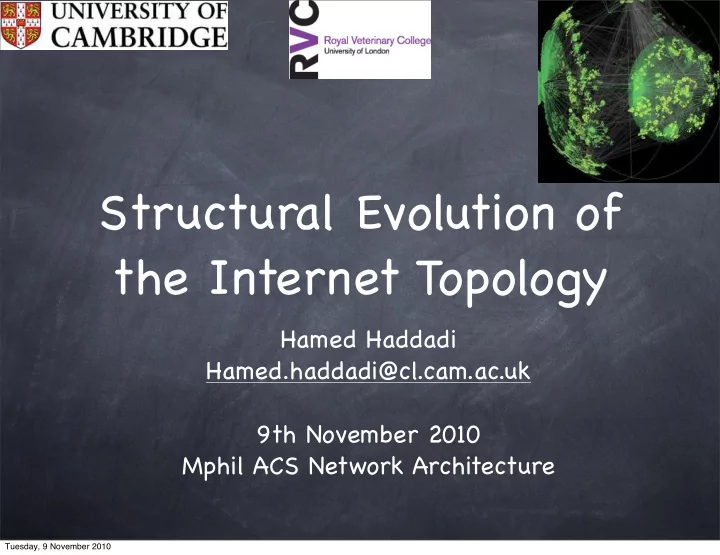

Structural Evolution of the Internet Topology Hamed Haddadi Hamed.haddadi@cl.cam.ac.uk 9th November 2010 Mphil ACS Network Architecture Tuesday, 9 November 2010
Internet Topology Inference Characterisation Generation Evolution Tuesday, 9 November 2010
Inference Router Level topology Administrative System (AS) Level Topology Donnet et al, Internet Topology Discovery: a Survey, (IEEE Communications Survey and Tutorials 2007) Haddadi et al, Network Topologies: Inference, Modelling and Generation, (IEEE Communications Survey and Tutorials 2008) Tuesday, 9 November 2010
Router level topology Inferred by sending out traceroutes globally Core Routers (CAIDA Archipelago: www.caida.org/projects/ark/ ) End-host (Dimes www.netdimes.org ) Single ISP domain (Rocketfuel www.cs.washington.edu/research/ networking/rocketfuel/ ) Accurate route that PACKETS take Issues: Router Alias Resolution, ECMP, Firewalls, Tuesday, 9 November 2010
AS Level topology Is formed of Autonumous Systems (ASes) Determined by relationships (Physical, connectivity, political) between ASes Tuesday, 9 November 2010
AS Level topology Is formed of Autonumous Systems (ASes) Determined by relationships (Physical, connectivity, political) between ASes As Topology does not accurately represent the routes taken by packets, nor it represents the physical topology, e.g., GEANT e.g.: http:/ / networktools.nl/asinfo/ www.google.com Tuesday, 9 November 2010
BGP types of relationship Customer-Provider pr provider ider cus customer omer IP traffic provider customer Customer pays the provider for connectivity Slide source: Tim Griffin, BGP Tutorial, ICNP 2002 Tuesday, 9 November 2010
BGP types of relationship Peering Relationship peer peer traffic traffic NOT provider customer allowed allowed Peers provide transit between their respective customers Peers do not provide transit between peers Peers (often) do not exchange $$$ Slide source: Tim Griffin, BGP Tutorial, ICNP 2002 Tuesday, 9 November 2010
BGP Overview Commercial relationships between ISPs Tuesday, 9 November 2010
Quantifying Measures Node Degree Distribution Average Neighbour Connectivity Clustering Coefficients Assortativity K-core Shortest Path Distribution Hamed Haddadi, Damien Fay, Almerima Jamakovic, Olaf Maennel, Andrew W. Moore, Richard Mortier, Miguel Rio, Steve Uhlig, "Beyond Node Degree: Evaluating AS Topology Models", Technical Report UCAM-CL-TR-725, University of Cambridge, Computer Laboratory, July 2008 Tuesday, 9 November 2010
Data sources CAIDA AS Topology: 7 years of traceroute measurements, starting in January 2001, IP addresses reported in the traceroutes are mapped to AS numbers using RouteViews BGP data UCLA Topology data: 52 snapshots, one per month, from January 2004 to April 2008. using data sources such as BGP routing tables and updates from RouteViews, RIPE Abilene and LookingGlass servers. Tuesday, 9 November 2010
Skitter View Tuesday, 9 November 2010
Skitter View Skitter data suggests an Internet moving from a less hierarchical to more hierarchical topology, as if the core was becoming more dominant. Tuesday, 9 November 2010
UCLA View Tuesday, 9 November 2010
UCLA View UCLA dataset shows a weakening hierarchy in the Internet, with more peering connections between nodes on average. Tuesday, 9 November 2010
Reconciling datasets The Internet, once seen as a tree-like, disassortative network with strict power-law properties, is moving towards an assortative and highly inter-connected network. Tuesday, 9 November 2010
Growth of BGP Routing Table Slide source: Geoff Huston, APNIC Tuesday, 9 November 2010
what Next: CDNs 10% of Internet traffic and growing largely Decline of P2P traffic Increased streaming, direct downloads & CDN Graph source: Craig Labovitz, Arbor Networks Tuesday, 9 November 2010
What next: Money Graph source: Craig Labovitz, Arbor Networks Tuesday, 9 November 2010
Reading and references 2009 Internet Observatory Report, Labovitz et. al., Arbor Networks, NANOG 47 H. Haddadi et. al., Mixing Biases: Structural Changes in the AS Topology Evolution, (COST-TMA 2010), Zürich, Switzerland, April 2010 Fay et. al., Weighted Spectral Distribution for Internet Topology Analysis: Theory and Applications, IEEE/ACM Transactions on Networking (ToN), Volume 18, Issue 1, February 2010 Amogh Dhamdhere and Constantine Dovrolis. 2008. Ten years in the evolution of the internet ecosystem. In Proceedings of the 8th ACM SIGCOMM conference on Internet measurement (IMC '08) H. Haddadi et. al., Modeling internet topology dynamics. SIGCOMM Computer Communications Review 38, 2 (March 2008) Tuesday, 9 November 2010
Next Session Online Social Networks Animal Association Networks Human Contact Networks hamed.haddadi@cl.cam.ac.uk Tuesday, 9 November 2010
Recommend
More recommend